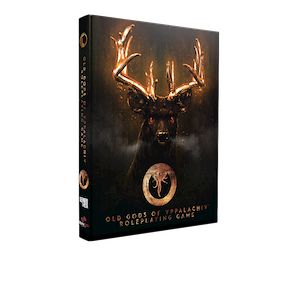Tabletop Trial- Old Gods of Appalachia
Last night, I had a session zero with a local group planning to run a one-shot for Old Gods of Appalachia, and I thought I'd capture my thoughts here. It was my first exposure to the Cypher System, which I've been eager to try. These were my impressions upon first blush with that system, and this specific product.
The Setting
This setting is so evocative! I've not yet listened to the popular podcast, but I can only assume that it is a faithful rendering of the atmosphere and lore generated by that talented team. I live in North Carolina, so the appeal of playing in an Alternative Appalachia has local and personal interest for me. The period (late 1800s - early 1900s) and locations (think coal mines and mining towns) immediately conjure a certain gritty backdrop that makes a great foil for the eldritch horror themes the game plays with.
Our group had a frank discussion about Lines and Veils, which is highly recommended for any RPG, but especially one with horror themes and a Fin de siècle deep south setting like this.
Character Creation
Character creation was straightforward, even for someone who hasn't played a Cypher game before. It centers around the creation of an introductory sentence of the form:
<NAME> IS A <DESCRIPTOR> <TYPE> WHO <FOCUS>. Essentially, "I am an adjective noun who verbs."
Characters have 3 stat attributes: Might, Speed, and Intellect.
We started with TYPE, which is basically the selection of archetype or "class": Explorer, Sage, Speaker, and Protector. It's the Noun in the sentence. Each of these roles, intended to fulfill an archetypal party role, influences the numeric point distribution among the 3 stat pools, provides different player Intrusion options, yields certain character Abilities and has an impact on skills and starting equipment.
Next, we chose DESCRIPTORS, essentially an Adjective like Brash or Tongue-Tied, that modify the character and give it some depth. Choice of Descriptor influences your stat pool, grants skills and equipment, and your reason for adventuring.
Third, we chose a FOCUS, the Verb of the sentence. This influences starting equipment, character abilities and growth (how you get more powerful with experience), how you're connected to other players, and suggestions for how the GM might Intrude concerning your character.
Finally, we named our characters and discussed our connections with each other. In my case, I generated the sentence: "Hosiah Gainwright is a Creative Sage who Crafts Powerful Objects." I was getting strong Alvin Maker vibes and wanted to lean into that, so I ended up with a craftsman character who has a real Knack for crafting things that do more than you think they should.
This process took about an hour for 6 people, most of whom had never played this game.
If I could change anything about the flow of character creation, I would put Focus after Type and before Descriptor. The choice of Focus feels more impactful and important than the choice of Descriptor, and I would have appreciated knowing that my character was a crafter of wondrous objects before choosing my Descriptor. For instance, I might have leaned away from Creative and into something else, instead of the near-redundant "creative who crafts" choice I ended up making during the session.
The Product
The book is gorgeous! Well bound, with quality paper, and great care given to the art and layout. It is Chonky! Over 400 pages long. My one complaint is that I wish the Players Guide would have been complete enough to allow character creation without reference to the full 400-page tome. Indeed, it probably would make the whole game much more usable-at-table if the two were completely broken out into a player-facing guidebook, and a GM-facing rule and setting book.


